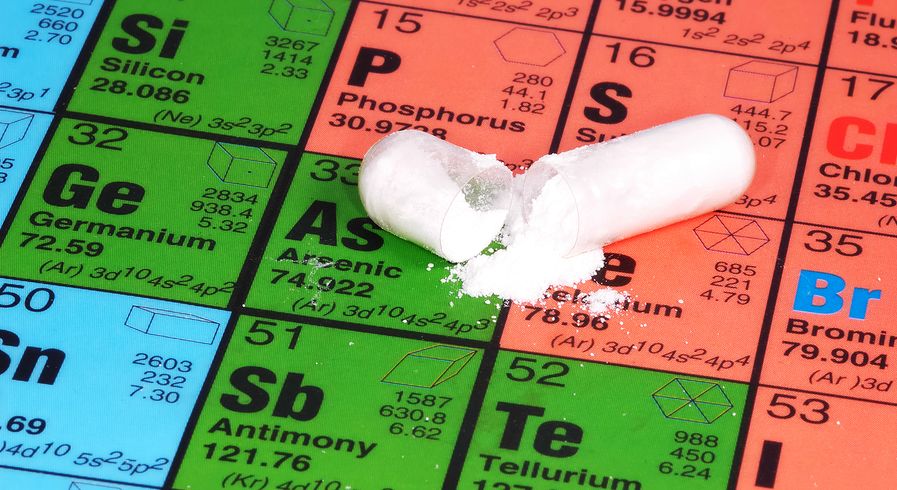Know Your Remedies: Arsenicum Album (Ars.)
 Common Name: Arsenic; White arsenic.
Common Name: Arsenic; White arsenic.
General Information
Arsenic is a toxic chemical element, historically used as a poison. It is safe to use with infants through to the elderly when prepared in homeopathic potencies. Those who need Arsenicum are prone to hypochondriasis and are intolerant of untidiness and disorder. They are anxious, critical, and restless, and dislike being alone but may be irritable with company. Restlessness may be followed by exhaustion which is out of proportion to their illness. They fear illness and disease, death, and being alone. Discharges tend to be acrid and burning. Burning pains paradoxically feel better for heat (except the headache which is better for cold applications). Thirst is for sips of warm drinks but cold drinks worsen. Symptoms worsen between midnight and 2 AM.
Mental-Emotional Symptoms
- Anxiety, especially about health matters. Hypochondiasis.
- Irritable and intolerant, especially with family members. Critical.
- Anxious when alone.
- Overly fussy about cleanliness and order.
- Restlessness leading to mental and physical exhaustion.
Colds and Hayfever
- Red, puffy, burning eyes that feel better for hot compresses.
- Watery, nasal discharge that burns and reddens the nostrils and lip.
- Frequent sneezing with no relief.
Coughs
- Worsened by cold air or cold drinks.
- Rapid, difficult breathing, with wheezing (asthma).
- Coughs or wheezing worse for lying down and better for sitting upright. Headaches
- Burning, throbbing pain.
- Worsened by heat and relieved by cold applications or cool air (though rest of body will be chilly and rugged up).
Skin Problems
- Eczema with burning, itching, dry skin.
Digestive Problems
- Thirst for frequent small sips of water.
- Burning stomach pains eased by drinking milk.
- Offensive, burning, scalding diarrhoea.
- A key remedy for food poisoning or gastroenteritis.
Fever
- Hot head and cold body.
- Chilly and want to be rugged up.
Sleep
- Restless and anxious – insomnia between midnight and 2 AM
- Dreams of robbers
For Pets
- Chilly, anxious pets.
- Itchy, dry skin eruptions in chilly, anxious animals.
Where do I find it?
Arsenicum Album (Ars.) is available from our online store as a single remedy and is also included in the following Complexes (combination remedies): Anxiety; Common Cold – Watery; Hay Fever; Insomnia; Mouth Ulcer; Panic Stop; Sinus Pain; Winter Defence.
Home Treatment Guidelines
Acute, Self-Limiting Conditions
Conditions like colds or minor injuries, which are short-term and typically improve on their own, can be managed at home with homeopathy. However, in emergencies or if symptoms worsen, contact your healthcare provider.
Chronic Conditions
These home treatment instructions do not apply for ongoing issues, whether mentioned above or not, like persistent allergies or chronic pain. You should consult a qualified homeopath for a personalized treatment plan to achieve the best results with homeopathy for chronic conditions.
How to Take the Remedy for Acute Conditions
- Take one pill or five drops of the remedy. The frequency depends on symptom severity. As examples:
- For life-threatening symptoms, take every 1 minute and seek emergency help immediately.
- For mild symptoms, take every 4 hours.
- Stop taking the remedy once you feel better. Resume if symptoms return.
- If no improvement after four doses, choose a different remedy or consult a professional homeopath.
- For more details on dosing, refer to: How Often to Dose with a 30C Homeopathic remedy.
- For information on the different potencies, read: Guidelines on which potency to use
Additional Notes From Past Masters
Homeopathy is a 200-year-old system of medicine. Early homeopaths recorded detailed notes on how remedies worked, including initial tests, remedy relationships, and their experiences. These writings were shared to improve homeopathic practice and now offer fascinating insights into past uses of homeopathy. Here’s an example, edited and modernised for clarity, from Leaders In Homoeopathic Therapeutics (1898) by E. B. NASH M.D.:
Leaders In Homoeopathic Therapeutics by E. B. NASH M.D.
Arsenicum Album (Ars.)
Great anguish and restlessness, driving from place to place.
Great and sudden prostration, sinking of vital force.
Intense burning pains.
Intense thirst; drinks often, but little, as cold water disagrees.
Dyspnoea < on motion, especially ascending.
Vomiting and stool simultaneous; < after eating or drinking.
Modalities: < in cold air, from cold things, cold applications; and 1 to 3 A. M. Movement.
> by warm air or room and hot applications, relieved by sweat.
* * * * *
No remedy is more restless than this one. The Aconite restlessness comes in the earlier stages of inflammatory diseases, with fever of a high grade. Arsenicum in the later stages, after the patient has become greatly reduced in strength, or in low grades of fever like typhoids.
The Aconite patient tosses to and fro in agony and fear. The Arsenic patient is too weak to toss as the anguish and restlessness would incline him to. He cannot move himself around as he desires, but wants to be moved from place to place, or bed to bed, while the least exertion on his own part exhausts terribly.
He has fear of death, but not like the Aconite fear, but rather an anxiety and a feeling that it is useless to take medicine for he is going to die; he is incurable.
The mental restlessness is as great as the bodily. He has attacks of anxiety that drive him out of bed at night. Even when there is no pain at all he wants to be continually changing place, walking about if strong enough, without any other reason than that he can’t keep still.
Often the first beneficial effect to be observed in cases calling for this remedy is that the anxiety grows less, the patient lies still, his pain is not so much less, but it does not make him so restless; he can bear it better.
This is a good sign and is generally followed by amelioration of all the symptoms. It makes little difference what the disease, if this persistent restlessness and especially if great weakness is also present, don’t forget Arsenic.
Arsenicum leads all the remedies for burning sensation, especially in acute diseases. It is not by any means confined to acute diseases, but is often found in chronic affections, especially of a malignant character or tending to malignancy. I think perhaps Sulphur outranks it generally for burnings in chronic affections.
There is hardly an organ or tissue in the human system where these burnings of Arsenic are not found. This burning, strange as it may seem, is greatly ameliorated by heat. Hot applications if they can be gotten in contact with the part, also heat of a warm stove or warm room.
This is the exact opposite of Secale cornutum, for while the part is objectively cold, it still burns, but hot applications are intolerable; they cannot even bear to have it covered; with Arsenicum, in throat complaints, in connection with acute catarrh, the burnings in throat and from the excoriating nasal discharge ameliorated by hot application.
The burning in throat is better from eating or drinking hot things. This is the chief modality which enables us to choose between this remedy and Cepa and Mercurius, for all the three have fluent coryza.
I once had a case of very severe gastralgia caused by suppression of eczema on the hands. I knew nothing of the suppression, but prescribed Arsenicum because the pains came on at midnight, lasting until 3 A. M., during which time the patient had to walk the floor in agony and there was great burning in the stomach.
She had but one slight attack after taking Arsenicum, but, said she, when I visited her, “Doctor, would that remedy send out salt rheum?” Then I found out about the suppression which had been caused by the application of an ointment, and told her that she could have back the pain in the stomach any time she wanted it, by suppressing the eruption again. She did not want it.
Arsenicum is one of our best remedies for fevers of a typhoid character. So useful is it that Baehr says -“Since Arsenic is, more than any other remedy, adapted to the worst forms of infectious diseases it seems wrong to delay its administration until the symptoms indicating it are developed in their most malignant intensity,” and further, “our advice, therefore, is that Arsenic should be given more frequently than has been customary from the very beginning of the attack, and that we should not wait until the disease has fully developed its pernicious character.”
I do not think this is sound reasoning or good advice, for I have never found any rule by which I could decide from the beginning that a case would later on develop into a case of the pernicious or malignant character which would ever call for the exhibition of Arsenic.
While we need not wait for a case to develop to that “most malignant” intensity which calls for Arsenic, we would not on the other hand be justified in giving Arsenic or any other remedy in anticipation of a condition which might never come.
Arsenicum is not the only remedy capable of curing these malignant cases, and how do we know after all that it may not be Muriatic acid or Carbo vegetabilis that will be the remedy after the case is developed.
There is no safe or scientific rule but to treat the case with the indicated remedy at any and all stages of the disease, without trying to treat expected conditions or future possibilities.
It would be out of place here to give all the indications for Arsenic in typhoids, as it would take too much space, and they can be found in Raue, Lilienthal or any good work on practice.
Arsenic is also fine of our best remedies in intermittents, especially after the abuse of Quinine. Close individualization is necessary here as elsewhere.
Arsenic profoundly affects the alimentary canal from lips to anus.
The lips are so dry and parched and cracked that the patient often licks them to moisten them. The tongue is affected in various ways. It may be dry and red, with raised papillae; or red, with indented edges; or white as chalk or white paint; or lead colored, or dry, brown or black, especially in typhoids. The mouth is dry or aphthous, ulcerated or gangrenous. The throat the same.
The thirst is indescribably intense and peculiar, in that notwithstanding its intensity the patient can take only a little water at a time. The stomach is so irritable that the least food or drink causes distress and pain, or immediately excites vomiting, or stool, or both together.
Cold drinks, ice-water, or ice-cream particularly disagree and create distress. Vomits all kinds and grades of substances from water or mucus to bile, blood, and coffee ground substances.
The pains in stomach are terrible and aggravated by the least food or drink, especially, if cold. The abdominal pains also are intense, causing the patient to turn and twist in all possible shapes and directions.
Diarrhea of all kinds of stools, from simply watery to black, bloody and horribly offensive, and finally the end of the tract is reached and we have hemorrhoids.
Now in every one of these affections, ranging along the whole length of the canal, and from the lightest grade of irritation to the most intense inflammatory and malignant forms of disease, we will be apt to find everywhere present the characteristic burning of this remedy, in greater or lesser degree; and the not less characteristic amelioration from heat, and also, though not quite so invariably, the midnight aggravation.
Arsenicum also has its sphere of usefulness in diseases of the respiratory organs.
First, for acute coryza it stands in the front rank, the choice often having to be made between this remedy, Cepa and Mercurius.
Arsenicum has the fluent discharge which corrodes the lips and wings of the nose and more burning than the other two remedies. It often follows well after Mercurius if that remedy only partially relieves.
Arsenicum is particularly efficacious in many affections of the lungs, where the breathing is very much oppressed.
Respiration is wheezing, with cough and frothy expectoration. Patient cannot lie down; must sit up to breathe, and is unable to move without being greatly put out of breath. The air passages seem constricted. It is especially useful in asthmatic affections caused or aggravated by suppressed eruptions, like pneumonia from retrocedent measles, or even chronic lung troubles from suppressed eczema.
I remember a case of asthma of years’ standing to which I was called at midnight, because they were afraid the patient would die before morning. Found that her attacks always came on at 1 A. M. Gave Arsenicum alb. 30th, and she was completely cured by it.
The symptom by Rollin R. Gregg, “Acute, sharp, fixed or darting pain in apex and through upper third of right lung,” is a gem, and has enabled me to cure a number of cases of obstinate lung troubles.
In the last stage off pneumonia of old people, with gangrenous expectoration, if the other symptoms correspond, this remedy has often saved life. The burning is often found here as elsewhere. Arsenicum is also one of our best remedies in pleuritic effusions.
Arsenicum also affects profoundly the nervous system.
To the characteristic restlessness, of which we have said so much, is added great Prostration. This prostration is present in most diseases, both acute and chronic, where Arsenic is indicated. For instance, in typhoids there is no remedy that prostrates more. Carbo veg. and Muriatic acid equal it, the difference being that the Arsenic patient wants to move or be moved constantly, while with the other two remedies there is almost utter absence of any such show of life.
Even if not confined to the bed, in acute or chronic diseases the patient is so weak that he is “exhausted from the slightest exertion,” must lie down. Sometimes this extreme degree of prostration comes on very rapidly.
Here is a picture that shows a condition of things in chronic trouble calling for this remedy. “From climbing mountains, or other muscular exertions, want of breath, prostration, sleeplessness and other ailments.” This shows how weak the patient is, and this weakness may be coupled with various forms of disease.
You may say it is common for sick people to be weak. True, but the Arsenicum patient is weak out off proportion to the rest of his trouble, or apparently so; and it is a general prostration, not local like the sense of weakness in the chest of Phosphoric acid, Stannum and Sulphur; or in the abdomen like Phosphorus; or in the stomach like Ignatia, Hydrastis and Sepia. Now I do not see how I can make plainer the value of prostration as an Arsenic symptom.
When we come to the tissues we find our remedy almost universally present.
It attacks the blood, causing septic changes, exanthemata, ecchymoses, petechiae, etc.
It attacks the veins; varices burn like fire, < at night.
It attacks the serous membranes, causing copious serous effusion.
It attacks the glands, which indurate or suppurate.
It attacks the periosteum.
It attacks the joints; causing pale swellings, burning pains, etc.
It causes inflammatory swellings with burning lancinating pains.
It causes general anasarca; skin pale, waxy or earth colored; great thirst (Apis none).
It causes rapid emaciation; atrophy of children.
It causes ulcerations, constantly extending in breadth. The ulcers burn like fire, pain even during sleep, discharge may be copious or scanty, the base blue, black or lardaceous.
Anthrax burning like fire; cold blue skin dry as parchment, peeling off in large scales.
“Sphacelus,” parts look black or burn like fire.
“Gangrene,” better from heat (worse, Secale).
“Parchment” like dryness, or dry scaly skin.
The skin troubles of this remedy are mostly dry and scaly, and almost always burning. It is one of our best remedies for affections caused by retrocedent or suppressed exanthemata, also for suppressed chronic eczema, etc.
But it is impossible and outside the scope of this work to mention by name all the affections of the tissues in which this remedy is useful.
Notwithstanding this, Arsenic is not a panacea. It must, like every other remedy, be indicated by its similar symptoms or failure is the outcome.
Its great keynotes are Restlessness, Burning, Prostration, and Midnight Aggravation.




